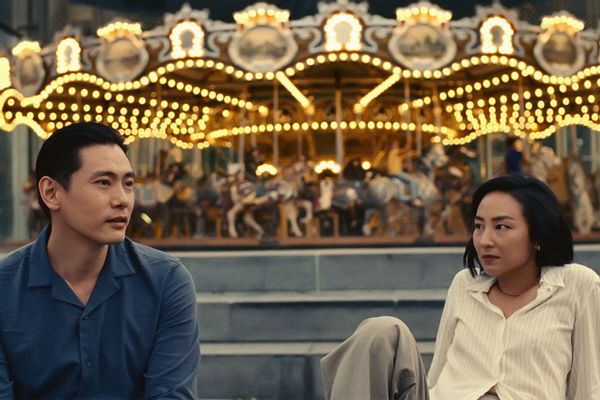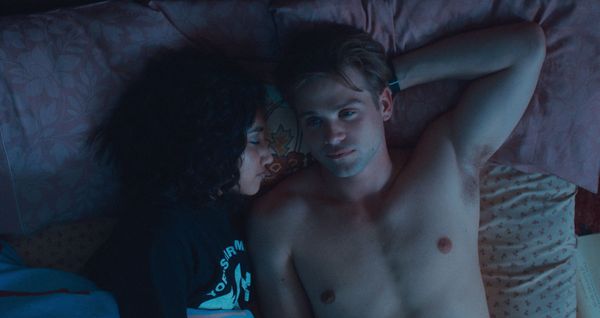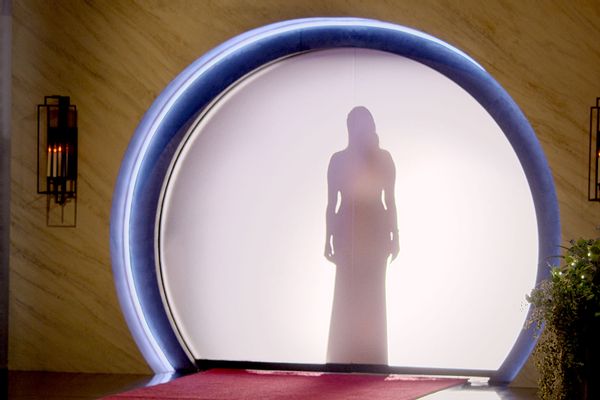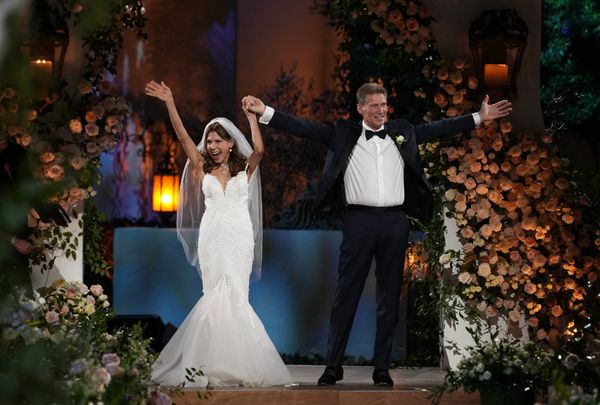
Last week Gerry Turner and his wife Theresa Nist, whose competition-driven courtship was chronicled on the first ever edition of “The Golden Bachelor,” announced their divorce on “Good Morning America.”
While they wisely refrained from divulging many specifics on national TV the septuagenarians said they took a hard look at their lives and felt like it was for the best, “for the happiness of each of us, to live apart,” Turner said.
Many poets write odes to love but this time Robert Frost had it right when he said nothing gold can ever stay. But even he may have been impressed by the speed of Turner and Nist’s marital dissolution – it took a scant three months between the live televised event that was “The Golden Wedding” and the couple’s “headscratcher” of a revelation to anchor Juju Chang.
Bachelor Nation citizens, meanwhile, have had 22 years of expecting each season’s engagement will be temporary. Besides, if you’ve been keeping an eye on other TV shows, movies and social media lately, you might say Turner and Nist are the more practical examples of a trend.
Take the last season of “Love Is Blind,” Netflix’s hit romance competition where people court each other sight unseen. One charming couple, Kenneth Gorham and Brittany Mills, were affectionate and loving after meeting each other and during the “getting to you know” paradise getaway the show rewards the duos who get engaged.
Gorham and Mills seemed to have everything going for them until they returned to the real world, where Gorham’s cell phone unexpectedly became the third partner in their relationship.
In a post-show EW interview Gorham explained their breakup was based on other factors, mainly due to her lack of a “crave” for him. But Gorham’s glued attention to his mobile remains a prime suspect in their affair’s untimely demise. Moments after the pair made their breakup official he was dialing someone. It wasn't a good look, just a typical one.
Unscripted reality isn’t the only genre lowering our expectations. Sunday brings in the conclusion of “Alice & Jack,” a very modern “Masterpiece” romance starring Domhnall Gleeson and Andrea Riseborough about a couple who are very much in love but for other head-scratching reasons can’t figure out how to be together.
There is nothing physically preventing them from following through with their feelings. Both live in the U.K. and are wealthy, high-functioning adults. Trying to remain friends ruined Jack’s marriage and made Alice jilt another man at the altar.
Radical honesty about his and Alice’s “It’s Complicated” status doesn’t go over well for Jack in his dating life. At a certain point he shares some version of a prepared script that goes something like, “I’ve been in love with someone for 15 years and she’s in love with me . . . We've never managed to stay in a romantic relationship together for longer than about 11 minutes. So, a long time ago, we decided to just be friends.”
He continues, “We have everything apart from the physical, basically, and that’s the way that that will stay. But I guess my point is that I am not a completely clean slate.” When against all odds he finds a woman who can accept those terms, he and Alice manage to muck that up too.

The Oscar-nominated “Past Lives” follows the wistful drifting apart of a writer, Nora (Greta Lee) and her first love Hae-sung (Teo Yoo). The two lose contact for 12 years after Nora’s family emigrates to the United States and reconnect after Hae-sung finds her again on Facebook. They launch a courtship he views as picking up from their pre-teen crushes and evolving into an adult romance.
Several continents, Skype conversations and promised visits aren’t enough to sustain Nora’s heart. She breaks it off. It shatters him, and the only way they’re able to heal is when he visits her in New York where she is married to a fellow writer, Arthur (John Magaro), that she happened to meet at a residency.
At least Nora found someone. Netflix’s adaptation of David Nicholls’s 2009 novel “One Day” follows Emma Morley (Ambika Mod) and Dexter Mayhew (Leo Woodall) over 20 years, starting on the night they meet, their graduation, where Emma diverts what Dex thinks will be a one-night stand into hours of conversation.
She’s brainy and bookish; he’s hot, popular and rich. They don’t look like they’d have anything in common and, indeed, Emma is their friendship’s main support as Dexter bangs women, drifts into shallow TV hosting jobs and an addiction to drugs and alcohol. But for those nagging, inscrutable reasons they’re continuously drawn to each other and have epically bad timing and taste in other lovers.

Love was never easy to find. Lasting romance and marriage, even less so. But certainly over the last 20 years – around the same amount of time it takes Emma and Dexter to keep missing each other, and slightly longer that Alice and Jack’s frustrations play out – forging lasting kinships with other people has gotten a lot tougher.
We know this from anecdotal evidence, sharing our dating experiences or hearing about them from friends. But poll data also confirms the suspicion that it’s not just you, or me, it’s all of us.
“Nearly half of U.S. adults – and a majority of women – say that dating has become harder in the last 10 years,” read the findings of a 2020 Pew Research Center poll, working from 2019 data. That report is four years old, granted, but the 47% of Americans who said then that dating is now harder than it was 10 years ago probably haven’t changed their minds.
This is borne out in a March report in The Economist distilling polling data from 20 wealthy countries, using the European Social Survey, America’s General Social Survey and the Korean Social Survey, to explain the expanding political gulf between young men and women. (Turner and Nist are in their 70s, we know, but stay with us.)
The article delves into the many reasons that young men are veering rightward politically, citing the widening education gap between men and women as a primary factor. In the United States, women are 10% more likely to earn a bachelor’s degree than men. This results in differing experiences in life work and romance, the Economist explains:
To simplify: when a woman leaves university in a rich country, she is likely to find a white-collar job and be able to support herself. But when she enters the dating market (assuming she is heterosexual), she finds that, because there are many more female graduates than male ones, the supply of liberal, educated men does not match demand.
The story also cites the prevalence of social media-aggravated polarization and the social and workplace strides women have made in what the conservative British publication describes as “advanced” countries.
These devices weren’t present in the Nora Ephron and John Hughes romances that defined the terms of romance aspiration for past generations. Mindy Kaling based two of her comedies, “The Mindy Project” and “Never Have I Ever,” on the type of expectations that genre set for us, with the girl getting the right boy in each, and not the boy she was expecting.
“Love Is Blind” pretends that’s possible too, emulating the dating app model by prioritizing voice and personality over photos, which tend to lie anyway. Although the series has a few successful marriages in its column, its most catastrophic failures demonstrate the shortcomings of tech-facilitated meetings and romance, innovations whose purpose are simultaneously at odds with and meant to ease the creation and maintenance of relationships.

Now consider how these translate into dating and romance, or even friendships. Innovations make it possible to forge partnerships without ever meeting in real life. Or, they act at a foundation that speeds connections to that elusive next level, which how Reesa Teesa’s viral 50-part TikTok story “Who TF Did I Marry?” came to be.
The video thread spans some eight hours and tells the story of Teesa meeting the man she calls Legion through Facebook Dating and Hinge before talking to him on the phone. He wooed her with promises of financial stability, a desire to own a home, marry and start a family. Soon he moved into her townhouse so they could spend the pandemic’s lockdown together.
From there her story spirals through a miscarriage, house purchases never materializing and a solar system of lies, ranging from fake family members to non-existent jobs and pretend phone conversations with parties who don’t exist.
Teesa assures us she’s not a dumb person, and the way she tells her story proves that – which is what makes her tale extraordinarily compelling and chillingly cautionary. She simply wanted things many of us want, a partner to rely on and to share a life with. Having the illusion of that possibility present itself a time when loneliness was endemic worldwide made her especially vulnerable, and in a way that anyone could have fallen for.
“I never thought I was going to be in some sort of Lifetime movie,” she said, “but I was.
At least Turner and Nist met in real life, albeit through the thoroughly manipulated “Bachelor” franchise speed-dating process. And their TV affair wasn’t without its bumps in the road; The Hollywood Reporter published a story pointing to several fabrications in Turner’s storyline that weren’t dealbreakers for Nist. Until, maybe, last week.

It is strange to think that this televised, gamified courtship is somehow more humane than the version facilitated via mobile devices.
Services such as Tinder or Hinge promise to ease, if not remove, irritating emotional friction to skip straight to the physical. But every relationship worth having requires negotiating another person’s feelings.
“Alice & Jack” and “Past Lives” center romances that either begin on an app, which is how Alice meets Jack, or is sustained for a time through electronic communication, as in “Past Lives.”
Each has consequences on the longer-term lifespan of whatever intimacies their characters can scrape out for themselves. (Emma and Dex share a Luddite’s version of not-love, sustaining their half-requited relationship through letters, emails and tearful answering machine messages, appropriate to the story’s timespan between 1988 and 2007.) Alice doesn’t want to know Jack until she decides she does months later, showing up unannounced without having called him.
Nora closes her laptop on Hae-sung’s Skype call, and that’s pretty much that. She meets Arthur and Hae-sung dates someone else until another 12 years go by and he shows up in New York, lovelorn and wondering what would have been.
That’s preferable, I suppose, to the “One Day” model of pining away for your college crush and putting up with his slights, arrogance and alcoholism for two decades only to finally win him — just in time for the worst to happen.
A version of that fear drove Turner and Nist to the altar, as they explained last fall after “The Golden Bachelor” became the franchise’s biggest hit in years. “We’re going to do it as quickly as we can because, at our age, we don’t have a lot of time to waste,” Turner said. “As quickly as we can put together a wedding plan, we’re getting married.”
Look how that worked out.
Around the same time that the Earth gasped at the announcement of the so-called “Golden Divorce,” another video went viral of a reporter hitting London’s streets and asking women whether they’d rather be stuck in a forest with a man or a bear. Seven out of eight chose the bear without hesitation.
As several of the women who were willing to chance it with a bear explained, they don’t necessarily attack you if you leave them alone. The wrong man might. And while that speaks to a more sinister aspect of the widening chasm between the sexes, it’s another indicator of what entertainment is reflecting.
When it comes to taking one’s chances with a stranger, we may be better off keeping our expectations reasonably pragmatic, if not bearably low, instead of plunging into the wilderness with our hearts exposed. That’s certainly a hopeful dream. But for many of us it’s been glitching.







